
Furman University
2021 President’s Report
 Students gather during Fall Orientation in 2020.
Students gather during Fall Orientation in 2020.
Furman University 2021 President’s Report

A Message from the President p. 2
The Furman Advantage .................p. 6
Begin with Belonging ..................... p. 14
Inclusive Excellence p. 22
Immersed in Discovery ................ p. 26
A Lasting Win ............................... p. 32
Partners in Progress p. 34
A Hope that Transforms p. 42
The Furman Band performs in 2020.
WE ARE FURMAN
Our vision, mission, values reflect who we are.
Reflection lives at the core of The Furman Advantage – and, really, all that we do at Furman University. It is how we take what we’ve learned and understand and grow from it. Reflection helps us to better understand our purpose and what constitutes a meaningful life.
It is with this in mind, along with our commitment to ensuring that all in our community feel welcome, that Furman recently revised its Vision, Mission and Values Statements. A working group of students, faculty, staff, alumni and trustees drafted the new statements, focusing on who we are, where we want to go, and what defines us as a university community. We introduced our new statements this past spring, beginning the new year by recommitting ourselves to our calling.
This past spring we also celebrated Joseph Vaughn ’68, Furman’s first Black undergraduate student, on what is now the annual Joseph Vaughn Day, on Jan. 29, and then on April 16, when we dedicated a statue in Vaughn’s honor – placed on a plaza bearing his name, in front of the Duke Library at the academic heart of our university.
We see Joe Vaughn and all he stood for in our vision, mission and values. He inspires us to commit ourselves to advancing
diversity, equity and inclusion. For many in our community, his statue is a beacon for belonging, as it is the first major representation of a person of color on our campus.
As we look to the horizon, we are guided by our new vision of “inspiring purposeful living and fostering thriving communities through learning, creativity and innovation.” We do this by continuing our commitment to outstanding undergraduate education and by broadening our academic footprint to benefit our students and the community through our institutes, advanced-degree programs, and new learning and service opportunities. We do this by creating a sense of belonging for all who are a part of Furman.
Moreover, our values complement and shape our vision and mission, “calling on us to meet the challenges and responsibilities of a complex, diverse and rapidly changing world with courage, moderation, justice, wisdom and humility.” Now more than ever, how we treat each other and care for our communities must be guided and driven by our values.
As Furman prepares for our third century, I am grateful to all of the members of our community who helped us to refocus our vision, mission and values – and to all who help us to live and fully realize them every day. We are Furman.

2 BEGIN WITH BELONGING
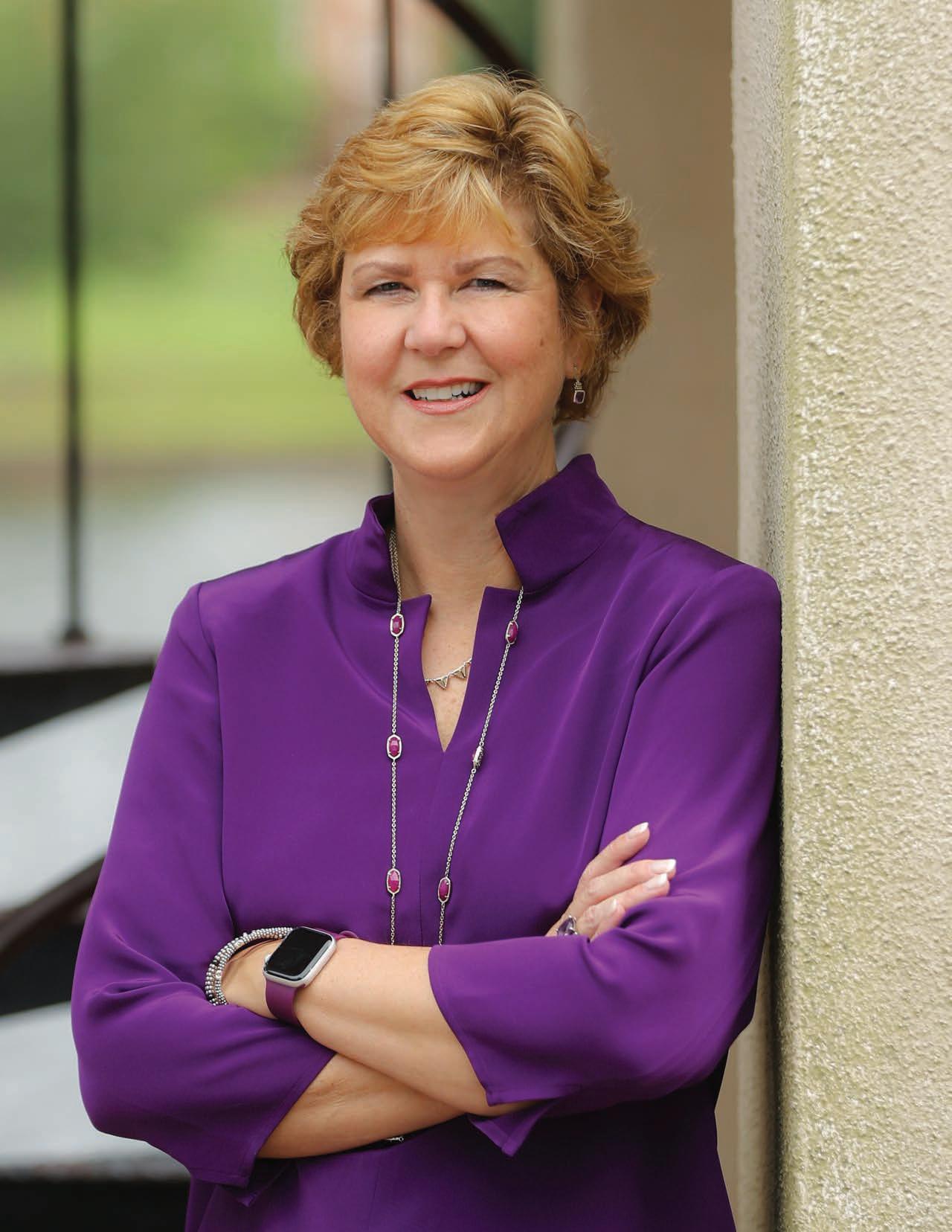 President Elizabeth Davis
President Elizabeth Davis
FURMAN UNIVERSITY consistently earns recognition for academic excellence, accessible professors, sustainability and value, and regularly ranks among the nation’s best colleges. Situated at the foot of the Blue Ridge Mountains, our 750-acre campus is also famous for its natural and architectural beauty. We were named a Tree Campus USA for the 13th straight year, earned a STARS Gold rating for the third time in a row from the Association for the Advancement of Sustainability in Higher Education, and were included in Southern Living magazine’s list of the “South’s Most Beautiful Colleges.”

# 15
THE TOP 20 BEST SCHOOLS FOR MAKING AN IMPACT The
# 49
# 46 UNDERGRADUATE RESEARCH/CREATIVE PROJECTS U.S. News
AMONG THE BEST COLLEGES FOR STUDENT VOTING Washington Monthly
THE BEST 387 COLLEGES The
Review
Princeton
U.S. News & World Report
FIRST-YEAR EXPERIENCE
& World Report
Princeton Review
#46 Best National Liberal Arts College
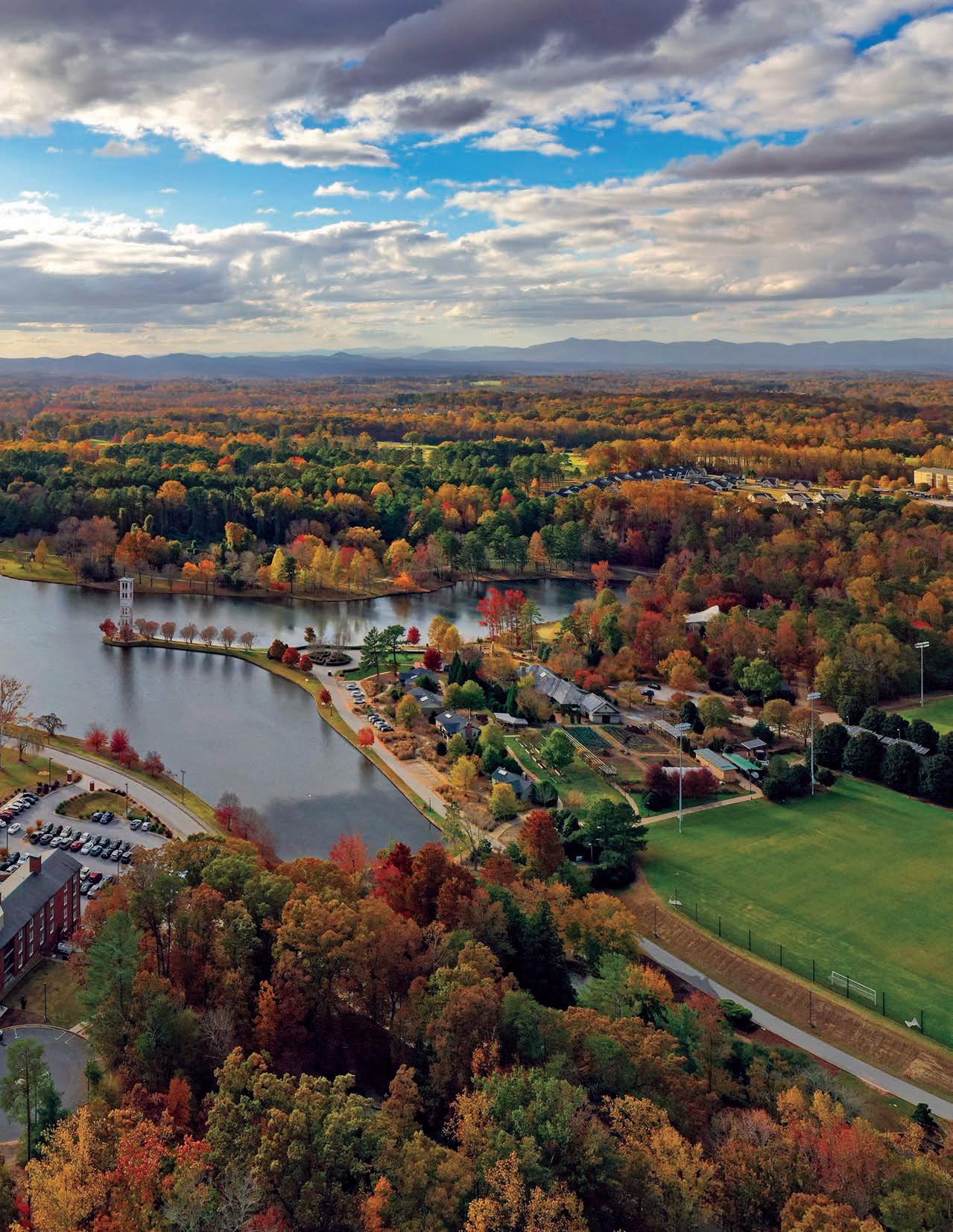
5 Years in a Row
#2 Best Colleges for Veterans
U.S. News & World Report U.S. News & World Report BEGIN WITH BELONGING 5
U.S. News & World Report
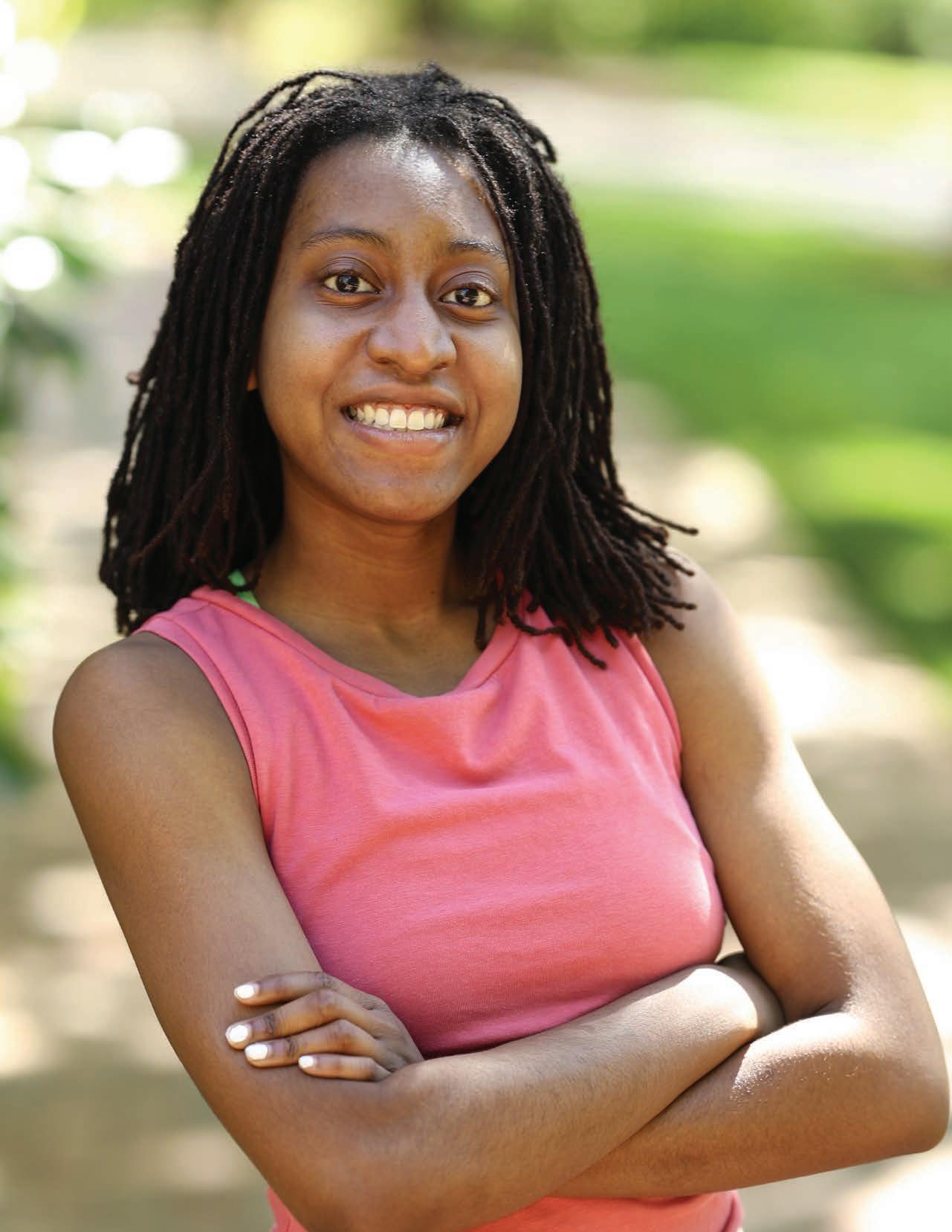 Ariel Crank ’22
Ariel Crank ’22
“ To me, Furman is a support system, a web of connections that faculty and staff share with each other to work on building relationships with students.”
ARIEL CRANK ’22 philosophy and English, writing track, double major
BEGIN WITH BELONGING 7
THE FURMAN ADVANTAGE
How do you know when you are on the right path?
It’s a question students think deeply about as they choose a major and eventually a career. It’s also one that institutions contemplate using a variety of metrics, benchmarks and critiques. This year, Furman earned a powerful vote of confidence, one that builds on earlier successes and signals anew that we are on the right path in our mission to prepare all students for lives of purpose.
In March of 2021, Furman received a $25 million grant from The Duke Endowment to expand and advance The Furman Advantage, the university’s signature approach to offering every student a pathway to an education that combines classroom learning with real-world experiences, reflection and mentoring.
The grant will make a difference in the lives of students and their families for years to come. It brings The Duke Endowment’s direct total investment in The Furman Advantage to $52.5 million.
With the 2016 grant from The Duke Endowment, Furman created positions to support faculty and students, including an associate provost for engaged learning and an associate dean for mentoring and advising, as well as positions that oversee internships, faculty development, student career engagement, and equity and inclusion.
We also used the grant to increase funding for engaged learning experiences; create rigorous assessment protocols to measure, evaluate and adjust programming; and support the Pathways pilot. Pathways is a mentoring and advising program for first- and second-year students that sets the foundation for a student’s four years by addressing themes related to academics, engaged learning, career development, reflection, and diversity, equity and inclusion.
In the Pathways program, students are encouraged to think about potential career paths by considering what they value, what they learn in classrooms and in their extra- and co-curricular activities, and by connecting students with alumni in their fields of interest.
Likewise, engaged learning experiences, such as internships, study away, undergraduate research and the opportunities available through Furman’s four institutes, are extensions of academic study. What students learn about themselves through mentoring and advising, and through reflection exercises, informs the kinds of engaged learning experiences they choose, as well as their major and career direction.
The faculty will consider this fall whether to extend the Pathways program to all students. If Pathways is fully adopted, the new funding from The Duke Endowment will help to finance it for five years.
THE DUKE ENDOWMENT’S DIRECT TOTAL INVESTMENT IN THE FURMAN ADVANTAGE IS $52.5 MILLION.
8 BEGIN WITH BELONGING
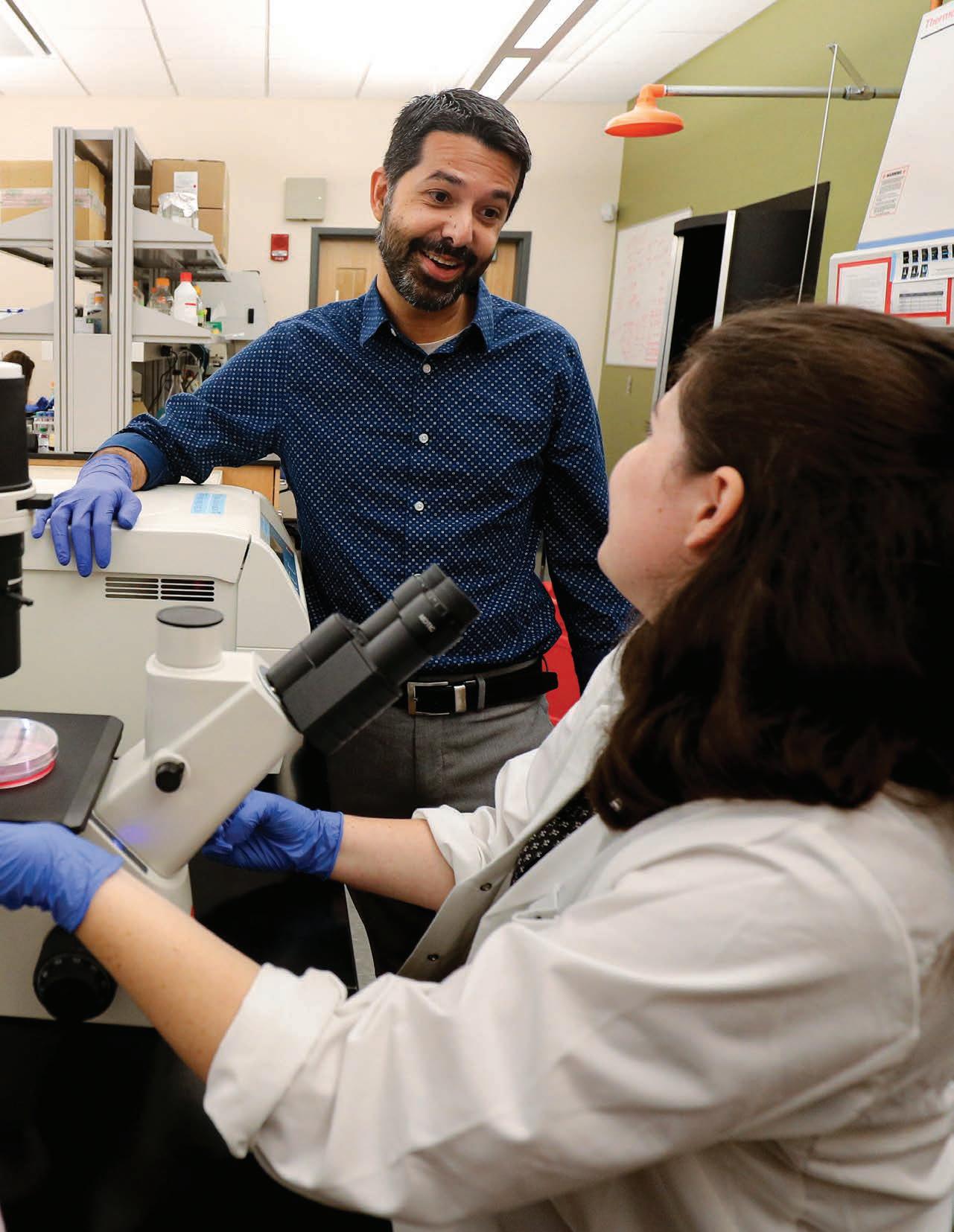 Adi Dubash, the Henry Keith and Ellen Hard Townes Assistant Professor of Biology, discusses research with Madison Thomas ’21.
Adi Dubash, the Henry Keith and Ellen Hard Townes Assistant Professor of Biology, discusses research with Madison Thomas ’21.
FOR ALL STUDENTS
The new funding allows us to continue to develop all the programs that began with the first grant, expanding and enhancing:
• engaged learning offerings,
• the mentoring network, and
• career and professional development activities for students through the Malone Center for Career Engagement and through academic departments.
The funds also are lowering students’ barriers to engagement, whether barriers related to a student’s finances, demographic representation or lived experiences – thus, increasing students’ sense of belonging as Furman increasingly reflects the rich diversity of our world.
The new grant also is providing funds for premier internships, research and study away, and student trips to meet with alumni mentors who work in relevant industries – all experiences that deepen a student’s understanding of what is meaningful and consequential about their life, and perhaps as importantly, what is possible.
YEAR ONE: EXPLORE & DISCOVER
• Settle into a new environment and gain a sense of belonging
• Connect with your advisor
• Begin to discover skills, interests and goals through academic coursework and activities
YEAR TWO: EXAMINE & DECIDE
• Prepare for engaged learning opportunities through coursework and conversations with advisors and mentors
• Begin to explore opportunities in engaged learning
• Select a major that meets life and career goals
YEAR THREE: CONNECT & REFINE
• Focus area of study through classroom learning, reflection, mentors and advisors
• Select engaged learning such as an internship, study away, research or community project through our institutes and other organizations
• Apply knowledge and skills to meet real-world challenges
YEAR FOUR: SYNTHESIZE & INITIATE
• Reflect upon experiences
• Integrate all you have done to create your narrative for employers and graduate schools
• Graduate ready to pursue a meaningful life and career

President Elizabeth Davis launched The Furman Advantage in 2016 with an initial grant of $25 million. In 2017, The Duke Endowment provided $2.5 million for Furman to partner with Gallup to help assess its impact. After this newest grant in March of 2021, The Duke Endowment’s direct investment in The Furman Advantage has reached $52.5 million.

BEGIN WITH BELONGING 11
© 2021 Furman University
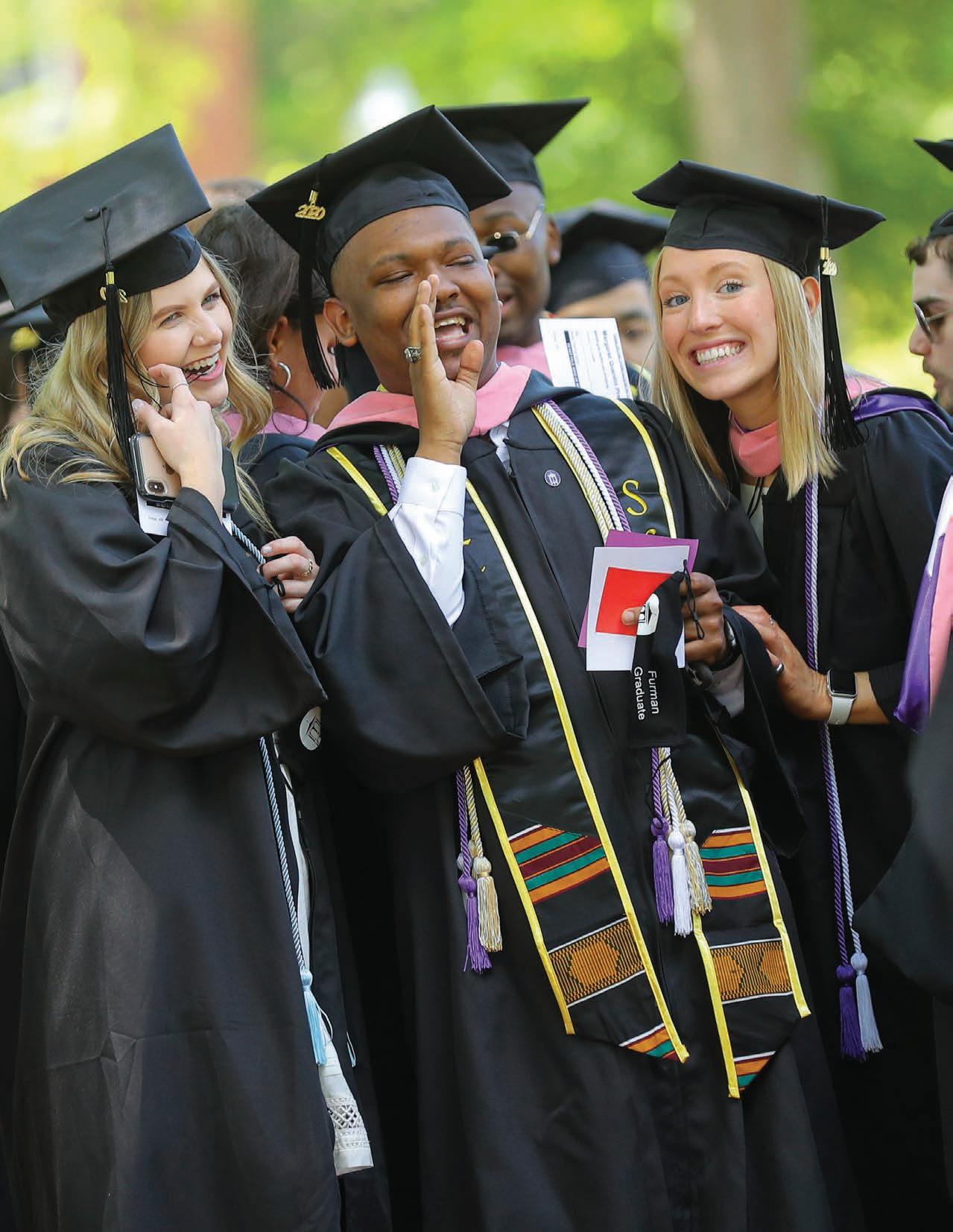
12 BEGIN WITH BELONGING
Class of 2020 graduates celebrate after Commencement.
TOP EMPLOYERS OF THE CLASS OF 2020
AMAZON
AMERICAN INSTITUTES FOR RESEARCH
AMERICORPS
BLUE CROSS BLUE SHIELD
CAPGEMINI
DELOITTE
EPIC
ERNST & YOUNG
FEDERAL RESERVE BANK
GENERAL MOTORS
GREENVILLE COUNTY SCHOOLS
INSIGHT GLOBAL
LIMA ONE CAPITAL
MATHER ECONOMICS
MERCER
MICHELIN
MILLIKEN & COMPANY
NORTHWESTERN MUTUAL
PRICEWATERHOUSECOOPERS
PRISMA HEALTH
SALESFORCE
SCANSOURCE
STRYKER CORPORATION
UNITED MINISTRIES
U.S. DEPARTMENT OF STATE
U.S. HOUSE OF REPRESENTATIVES
U.S. SENATE
94% POST-GRADUATION SUCCESS
EMPLOYED 42%
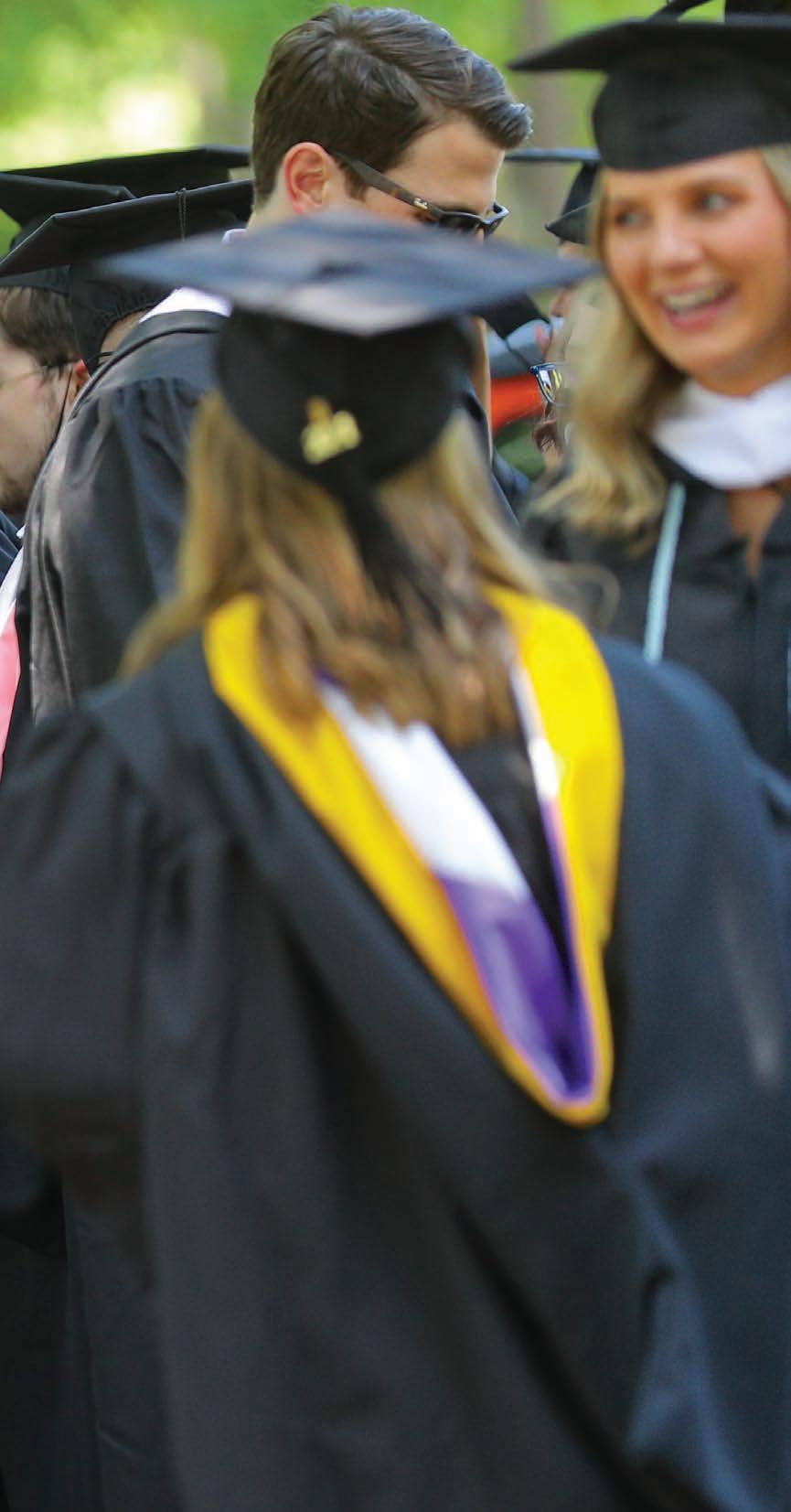
SAMPLING OF GRADUATE SCHOOLS
AMERICAN UNIVERSITY
BOSTON UNIVERSITY
CLEMSON UNIVERSITY
COLUMBIA UNIVERSITY
CORNELL UNIVERSITY
DUKE UNIVERSITY
FURMAN UNIVERSITY
THE GEORGE WASHINGTON UNIVERSITY
GEORGETOWN UNIVERSITY
LONDON SCHOOL OF ECONOMICS
MEDICAL UNIVERSITY OF SOUTH CAROLINA
NEW YORK UNIVERSITY
NORTH CAROLINA STATE UNIVERSITY
PRINCETON UNIVERSITY
UNIVERSITY OF COLORADO
UNIVERSITY OF FLORIDA
UNIVERSITY OF MICHIGAN
UNIVERSITY OF NORTH CAROLINA
UNIVERSITY OF SOUTH CAROLINA
UNIVERSITY OF TEXAS
UNIVERSITY OF VIRGINIA
VANDERBILT UNIVERSITY
WAKE FOREST UNIVERSITY
OF GRADUATES ARE EMPLOYED, ENROLLED IN GRADUATE SCHOOL OR PARTICIPATING IN SERVICE (6 months after graduation)
CONTINUING EDUCATION 42%
CONTINUING EDUCATION AND EMPLOYED 3%
INTERNSHIP 3%
VOLUNTEER SERVICE/MILITARY 3%
BEGIN WITH BELONGING 13
“The Furman University that stood in the 1960s is not the Furman University that stands here today, but we must not let (Vaughn’s) legacy of change go unanswered.”
QWAMEEK BETHEA ’21, president of Furman’s NAACP chapter, during the Joseph Vaughn ’68 statue unveiling ceremony in April
14 BEGIN WITH BELONGING
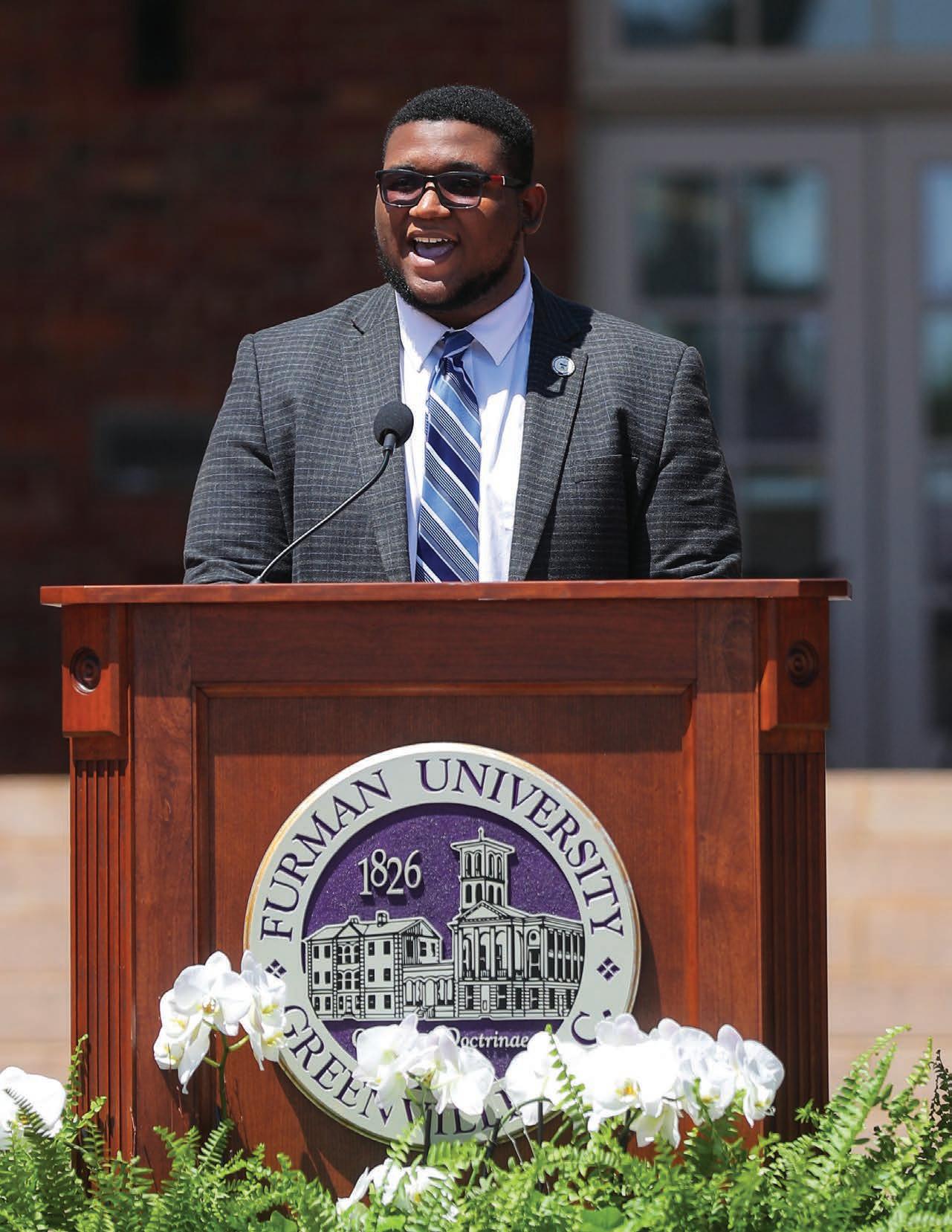 Qwameek Bethea ’21 speaks in April 2021 during the Joseph Vaughn ’68 statue unveiling.
Qwameek Bethea ’21 speaks in April 2021 during the Joseph Vaughn ’68 statue unveiling.
BEGIN WITH BELONGING
What does it mean to create education that transforms, to build connections that endure and to support communities that flourish? And how do we pursue these ideals? Our new Strategic Diversity Plan lays out our common goals and objectives and expresses our approach to the concept of inclusive excellence.
The catalysts
Inclusive excellence is a framework that supports the integration of diversity, equity and inclusion into the core functions and operations of the university. Inclusive excellence advances The Furman Advantage by institutionalizing educational equity and reflecting an explicit understanding that diversity, equity and inclusion are not isolated initiatives but rather catalysts for institutional and educational excellence.
Beliefs and values
• We acknowledge that we must be truly inclusive to be truly excellent.
• We aspire to promote meaningful communication, strong support and shared experiences among people of different identities and life experiences.
• We act to remove obstacles to attaining diversity, equity and inclusiveness in the recruitment, retention and advancement of students, faculty and staff from under-represented groups.
• We foster in our students a sense of social justice and encourage them to exercise their civic responsibility in creating a fair and equitable order.
Alongside our new Strategic Diversity Plan, this year also brought new Mission, Vision and Values Statements and an expanded institutional history that provides a more complete telling of Furman’s story. This updated history credits the contributions of enslaved people and acknowledges the historic racism of members of the Furman family.
The plan corresponds with a related conversation, one in which the Ad Hoc Committee on Black Life at Furman presented a comprehensive report to President Elizabeth Davis. The report recommended ways to advance strategies and actions related to the university’s commitment to anti-racism, diversity, equity and inclusion.
16 BEGIN WITH BELONGING

WE ACKNOWLEDGE THAT WE MUST BE TRULY INCLUSIVE TO BE TRULY EXCELLENT.
Members of the Class of 2025 get to know one another during Summer Orientation in June 2021.
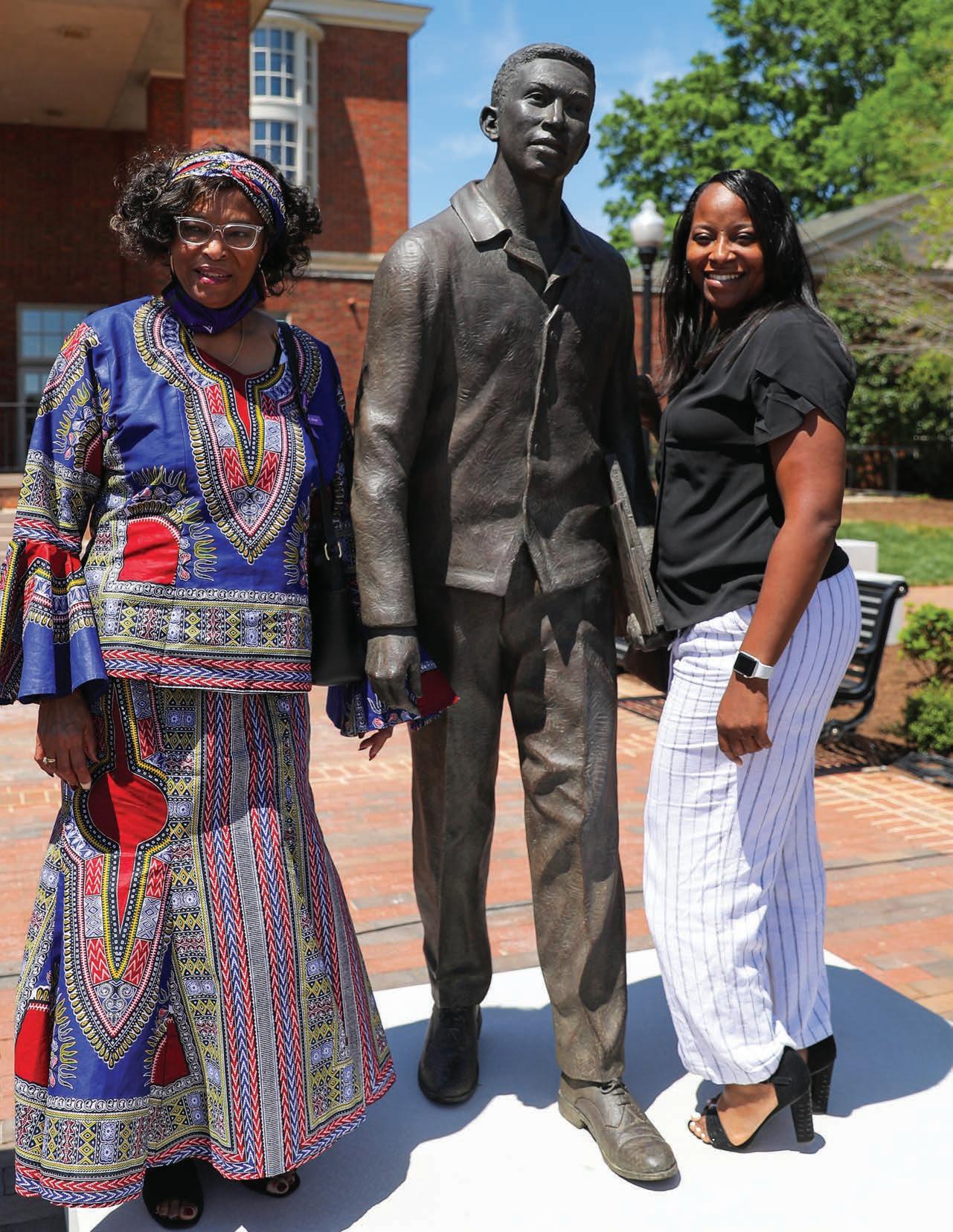
“A MAJORITY OF ONE”
JOSEPH VAUGHN ’68
Lillian Brock Flemming ’71 M ’75 H ’14 (left), one of Furman’s first African American students, and family friend Kayla Randolph stand with the Joseph Vaughn ’68 statue during the unveiling in April 2021.
A number of steps have already been put into motion, including
• the creation of the Black Alumni Council,
• changes to Furman’s website to provide more information on diversity, equity and inclusion,
• the completion of a proposal for a major in Africana studies, and
• a revamping of our bias incident response system.
Since launching The Furman Advantage in 2016, Furman has adapted its critical analysis of the student experience to better deliver on its promise, positioning Furman at the forefront of universities that are focused on student belonging. Our strategic vision aligns community engagement with a knowledge of privilege. This allows our students to build coalitions that seek to propel equitable social change across race, socioeconomics, political affiliation, religion, ability, sexuality, regionalism, gender identity and more.
To advance this, Furman secured a $150,000 grant from the Hearst Foundation to help increase historically underrepresented students’ participation in programming and experiences offered through The Furman Advantage. Hearst Fellows have access to all of Furman’s premier programs, but with additional mentoring and financial support.
At the heart of this mission is the Center for Inclusive Communities, which supports the immediate and long-term success of Furman’s historically under-represented students. Using current research on belonging, well-being and

career engagement, the center helps prepare Furman students to appreciate difference and to make a lasting positive contribution in their post-graduation life.
To move us forward …
• The Office of Spiritual Life developed on-campus, mentored internships for the Exploration of Vocation and Ministry program. The campus cohorts included groups who studied and developed programming in the areas of pastoral care, racial justice and faith and politics.
• Furman will host its first LGBTQ+ Homecoming tent in October, connecting alumni with current faculty, staff and students.
• The Black Alumni Council was officially recognized as one of the university’s premier volunteer leadership groups. The council’s representatives work to increase engagement with Black alumni, support the undergraduate experience for Furman’s Black students, participate in meaningful dialogue with university leadership, and oversee the activities of the Black Alumni Association.
Task Force on Slavery and Justice
“A majority of one” is how Joseph Vaughn ’68, Furman’s first Black undergraduate student, described his experience, which led to the university’s desegregation. In April, with the unveiling of a statue of Vaughn, we further refined our self-image by making clear who we are and what we value. Community members gathered virtually and on campus to celebrate
“When new students come on campus, I hope they feel included, and I hope they have a sense of belonging to a university community that wants to embrace them and support them in every way possible.”
MICHAEL JENNINGS , professor of education, who served as chief diversity officer from 2017 to 2021
BEGIN WITH BELONGING 19
and reflect on Vaughn’s legacy, the power of the statue – which welcomes all to campus the way Vaughn the man once did – and the completion of the plaza bearing his name.
This latest evolution of the campus landscape is among the recommendations of Furman’s Task Force on Slavery and Justice, which was formed in the spring of 2017 with the support of the president and provost. That decision and the ensuing “Seeking Abraham” report brought to life Furman’s principles as an institution, which embody the ideals of the liberal arts and sciences, including a high regard for human value, reflection, innovation and relentless accuracy. Students, faculty, staff and alumni from across academic departments and experiences contributed to the report.
In a less visible but still deeply held commitment to recognizing the past and present harms of racism, we created a university holiday for Juneteenth after U.S. President Joe Biden signed legislation making it a federal holiday.
Agents of belonging: the faculty
Of seven tenure-track faculty members hired in the last academic year, two are Hispanic or Latino, one is Asian, and one is Black/ African American. This representation matters because students, faculty and staff
should see themselves reflected in the faculty, and students of diverse backgrounds should have a community of mentors who model academic leadership but also embody the full range of lived experiences, backgrounds and identities that exist in our society.
What else can be done to create an institution steeped in the culture of belonging? The Faculty Development Center plays a powerful role.
• As a part of the “Summer 2020 Vision” series for online and hybrid learning, the center held course- and researchredesign planning modules to facilitate supportive, accessible learning communities across online, hybrid and in-person formats. Partnering with the university’s IT department, the center provided teaching demonstrations to help faculty maximize new classroom technology during the pandemic.
The purpose of it all?
To ensure that no matter how students participated, where they joined from, or what constraints they may have had, they were included and supported as a part of a learning community set up for their success.
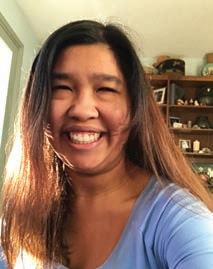
“I’m a tactile learner. I prefer when I can get my hands on a Braille copy, just because I retain information better and understand it more.”
FATIMA QUINTANA ’24
Four offices across campus worked together to design and build a 3D Braille model of a course concept for her sustainability sciences class.
20 BEGIN WITH BELONGING
• The Faculty Development Center also offered programming focused on inclusive pedagogy and dialogue across interpersonal differences. Workshops dealt with building inclusive and anti-racist syllabi and helped individual departments review their curriculum and courses to ensure equitable access and learning outcomes.
• The center also designed a new initiative called Talking Teaching, aligned with the book, “Bandwidth Recovery,” focused on recovering the cognitive resources that underrepresented students lose to poverty, racism and social marginalization.

• The center partnered with five peer institutions to receive a CREATE grant (Conversation-Rich Education for Anti-Racist Teaching/Learning Environments) from the Associated Colleges of the South to launch a peer-to-peer conversation initiative among faculty and staff about race, diversity, equity and inclusion.
In all, the goal of these efforts is to help facilitate transformative learning experiences where diverse individuals can come together to develop a shared sense of belonging and purpose.
Students take a study break across from the Furman Bell Tower.
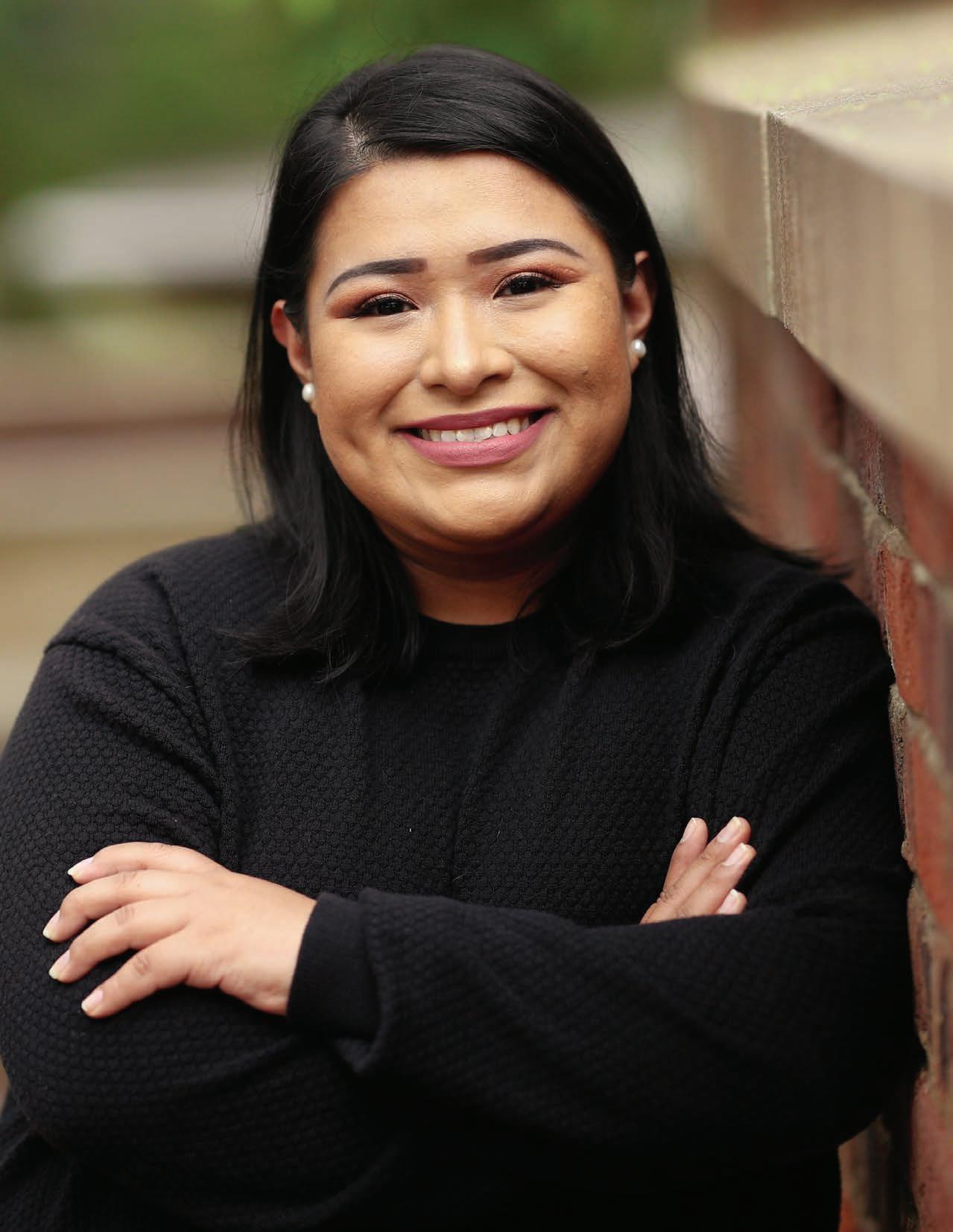 Ingrid Ramos Rivera ’21
Ingrid Ramos Rivera ’21
“I want to visit Mexico and take some time to appreciate what I’ve learned in my Furman classes and apply it. That’s one of my top priorities — never forgetting where I came from.”
INGRID RAMOS RIVERA ’21
doubled-majored in Spanish and politics & international affairs. She was born in California and raised in Mexico.
BEGIN WITH BELONGING 23
INCLUSIVE EXCELLENCE
Across counties and states, regions and oceans, these students have journeyed and planned, dreamed and prepared. They looked at our reputation and our student experience – a mix of mentoring, reflection, engaged learning and belonging – and saw their place at Furman.
Arriving amid the global pandemic, the Class of 2024 showed a determination that was matched only by our faculty and staff’s resolve in welcoming them.
In the 2020-21 academic year, 519 first-year students joined the Furman family. Recruited almost entirely virtually, 28% are from South Carolina, 70% are from out of state and 2% are from outside the United States.
While these new students came to know Furman in a way that reflected the challenges of the pandemic, they uphold the university’s tradition of academic excellence. They are among the world’s most academically talented, with 44% ranking in the top 10% of their high school graduating class, an average SAT score of 1334 and average ACT score of 30. These students continue Furman’s trend toward increasingly diverse classes, with
Admissions (Fall 2020 Entering Class)
APPLICATIONS: 5,194
ACCEPTANCES: 3,389
ENROLLED: 519
African American: 8.36%
Asian: 3.69%
Hispanic: 5.44%
White: 76%
Multiracial or other: 4%
International: 2.5%
Fall 2020
23% non-international students of color and 13% first-generation students. In addition to the 519 first-year students, 22 transfer students enrolled in Fall 2020.
To tell our story …
We hosted more than 3,100 virtual events, from high school visits and college fairs, campus visits and conversations, to regional showcases, academic department showcases, college counselor lunch and learns, and a college toolkit series for prospective students and parents.
In doing so, we doubled the number of prospective student recruitment events we either participated in or hosted for the 2021 admissions cycle. That led to a record number of both inquiries and applications submitted to Furman for Fall 2021. These efforts benefited from new web features, such as a 360-degree virtual tour site that allowed visitors to learn about and tour key campus locations remotely.
The admissions office reopened for campus tours in June 2020 for applicants only and reopened for all prospective students beginning in summer 2021.
Total Enrollment
2,345 UNDERGRADUATE STUDENTS
Men: 38.8%
Women: 61.2%
African American: 6.86%
Asian: 3.21%
Hispanic: 5.51%
White: 77.47%
Multiracial or other: 4.34%
Total diversity: 22.53%
International: 2.6%
48 STATES REPRESENTED 28 COUNTRIES REPRESENTED 122 GRADUATE STUDENTS
AVERAGE CLASS SIZE: 14
STUDENT-TO-FACULTY RATIO: 9:1
24 BEGIN WITH BELONGING
Tuition $51,712 Fees $380 Room (average) $8,072 Board (average)
Total
COST OF ATTENDANCE (2020-21)
$6,050
Direct Costs $66,214
Our invitation to the world
• We incorporated United World College schools into the international student recruitment. This included hosting virtual visits to all 18 UWC schools this year, as well as participating in virtual presentations and events with counselors, students and parents around the globe.
• We hosted virtual workshops, webinars and presentations around the world through Council of International Schools, EducationUSA centers, as well as with individual high schools and independent counselors.
• We called on our strong international alumni network in China, which assisted with the recruitment and enrollment of international applicants and helped to provide access to a new pool of qualified potential applicants.
The results? Our virtual recruitment efforts powered an 80% increase in international applications for the incoming class.

1,007 VIRTUAL TOURS CONDUCTED WITH PROSPECTIVE STUDENTS
3,144 VIRTUAL STUDENT SESSIONS, HIGH SCHOOL VISITS AND TRAVEL EVENTS WERE HELD
7,291 STUDENTS AND PARENTS ATTENDED THE VIRTUAL EXPERIENCES
A student rides a Onewheel next to Furman Lake on the first day of class in August 2020.
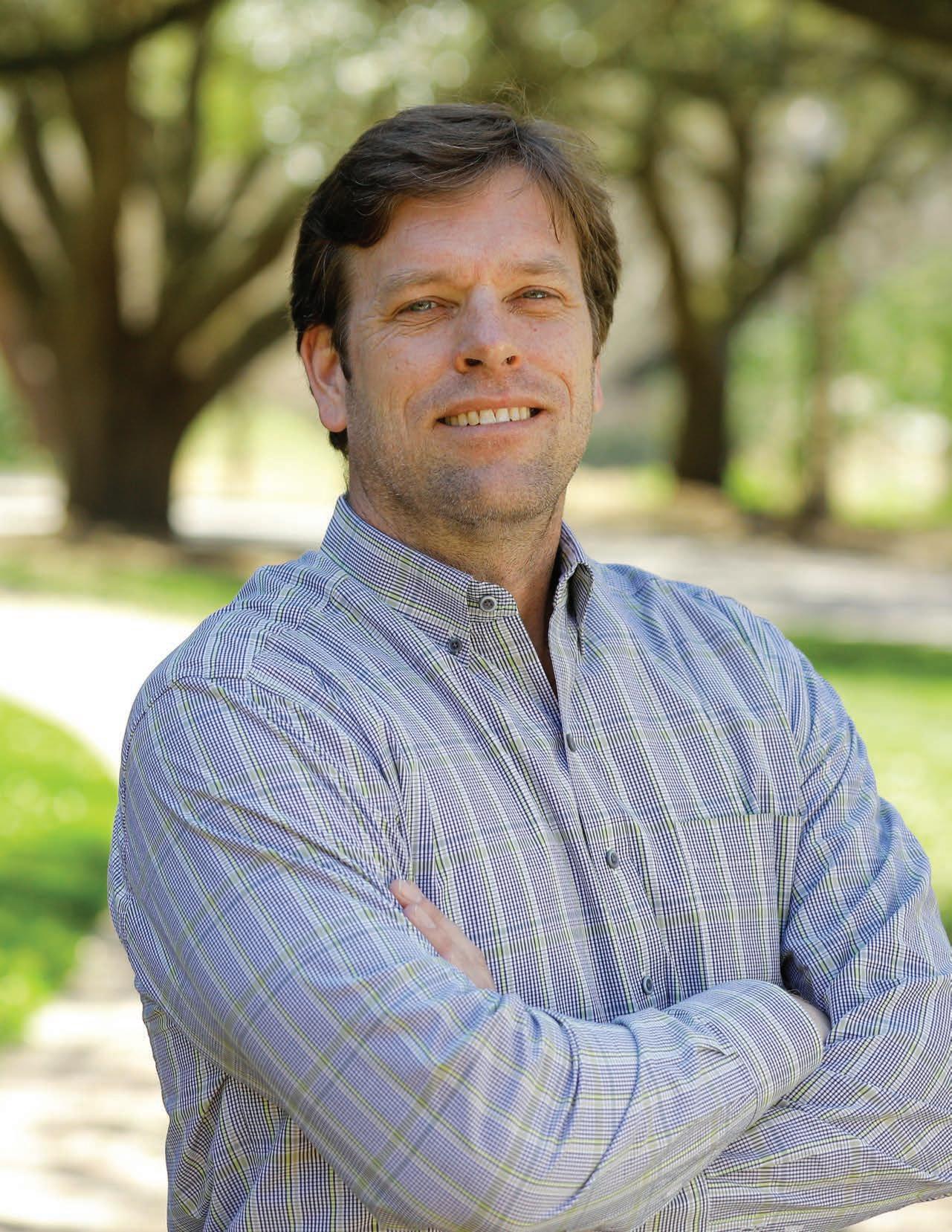 Erik Ching, the Walter Kenneth Mattison Professor of History and director of undergraduate research
Erik Ching, the Walter Kenneth Mattison Professor of History and director of undergraduate research
“The entire institutional mission has been built around providing every student with at least one engaged learning experience before they graduate.”
ERIK CHING , director of undergraduate research, after The Duke Endowment’s most recent investment in The Furman Advantage, a $25 million grant announced in March 2021
BEGIN WITH BELONGING 27
IMMERSED IN DISCOVERY
I’m in the right place.
That’s the feeling of a student whose study away experience, classroom learning and advising set her on the path to an internship that advances and refines her career plans. That’s the realization of the alumnus whose chosen graduate program resoundingly affirms the trajectory he started at Furman.
For both, it’s a deep sense of belonging. It’s a powerful knowing. It’s finding your people and following your calling – the first, by experiencing and in turn fostering a culture of inclusion at Furman, the second, by following Furman’s guided blend of experiences, mentoring and reflection to a place of purpose.
We have developed The Furman Advantage in much the same way we encourage our students to approach learning and life. Each student has the opportunity to experience transformational learning and mentoring on a pathway to success, so the quality of their education is reflected in the quality of their lives long after they graduate.
An essential transition Pathways provides advising and mentoring for first- and second-year students in small classes with a single advisor. It eases the transition to college and helps students explore, to learn how to develop their independence, and to start thinking about vocation and what they do best. Instead of
thinking only about a degree, they think about the skills that will serve them beyond Furman. In the first years of The Furman Advantage, we developed the pilot for Pathways, which has now reached more than 400 students across four cohorts.
Frequent assessment has been a central piece of The Furman Advantage. Students in the Pathways program report higher satisfaction scores for advising. Early pilot data also suggest that Pathways closes gaps between majority students and students from low-income families, first-generation college students and students of color in
• advising satisfaction,
• belonging,
• participation in engaged learning experiences, and
• earlier and more frequent appointments with career counseling.
For all students, data from the first three years of The Furman Advantage point to a multitude of benefits, including:
• funding support for all students who applied for summer research and internships,
• increased need-based funding for study away,
• increased participation in engaged learning experiences, and
• increased participation in multiple engaged learning experiences. The results? An environment in which students are more likely to think their
28 BEGIN WITH BELONGING
IT’S FINDING YOUR PEOPLE AND FOLLOWING YOUR CALLING
education was valuable, to feel more affinity for Furman, and to hold jobs or pursue graduate studies after Furman that they find fulfilling. We’re strengthening resilience by building a strong foundation of academic, social and coping skills.
To realize what’s possible
The effects of diet on brain activity. Quilt as autobiography. Artificial intelligence in the stock market. These were just a few of the presentations that more than 650 students shared of their internships, research, service learning, study away, creative projects, first-year writing seminars and capstone experiences during the annual Furman Engaged event. The daylong celebration is sponsored by Furman’s Center for Engaged
Learning, which facilitates the highimpact, co-curricular opportunities that develop students’ sense of purpose, intellectual curiosity and civic and global engagement, while preparing them for graduate school, professional school or the workforce. In its 13th year, Furman Engaged was held virtually for the second time, and offered both live and recorded sessions representing experiences from all of Furman’s academic departments, centers and institutes. Furman Engaged represents the final step of students’ deep learning experiences – the public sharing of their work. Students synthesize what they learned about their disciplines and about themselves, while sharing with their peers and the broader community the experiences that are possible at Furman.

“The way I saw students talk about their research, like it meant everything to them, and to have peers cheer them on and support them by listening to their talks … really just showed me how close of a community Furman has.”
CONOR BREADY ’24 on the 13th annual Furman Engaged
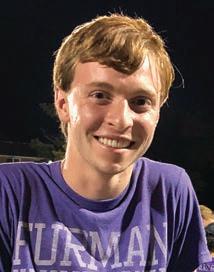
BEGIN WITH BELONGING 29
From left: Tom Petty, Maya Bismark, Julia McCabe and Eli Titherington work on their presentation for Safe Harbor during a MayX course in design thinking.
Conor Bready ’24
High-impact experiences
The mission of the Center for Engaged Learning, which includes the offices of internship, research and study away, is to ensure that all students have access to at least one high-impact, immersive, high-quality engaged learning experience.
79% HAD AT LEAST ONE PROFESSOR AT FURMAN WHO MADE THEM EXCITED ABOUT LEARNING
71% HAD AN INTERNSHIP OR JOB THAT ALLOWED THEM TO APPLY WHAT THEY WERE LEARNING IN THE CLASSROOM
88% REPORTED HAVING AN ENGAGED LEARNING EXPERIENCE AT FURMAN – Senior Survey results for the class of 2021
59% REPORTED HAVING A STUDY AWAY EXPERIENCE
Summer research soars
Our nationally recognized program, supported by the Office of Undergraduate Research, the Office of Integrated Research in the Sciences, and academic departments and offices throughout campus, offered students the same breadth and depth of research topics as previous years but in virtual, in-person and hybrid formats. Furman’s undergraduate research program is known for its high success rate in capturing competitive federal grants, national awards for both students and faculty and student/faculty co-authored publications in prominent, peer-reviewed journals.
The number of students and faculty who have been doing summer research together has steadily increased since it began in 1966, reaching a new height over the summer of 2021. In total, 272 summer research fellows worked with 104 faculty members – the most in Furman’s history. Student researchers wrote original jazz scores, studied the tectonic
development of North America during the Mesoproterozoic era, and examined the causes of death for police officers in the U.S. Some student researchers will be able to submit their research for publication in an academic journal, while others hope to present their research at a professional conference. But all of them, through mentoring and real-world learning, gained insights into their strengths, interests and, in many instances, their next steps after Furman.
The Internship Office
The Center for Engaged Learning’s Internship Office made a full rebound this year. The office held more than 600 meetings with 465 unique students, delivering 80 hours of presentations to more than 1,300 students. The office also improved by 4% its outreach over the prior academic year to reach 23% of students from underrepresented groups. And while internships had to be remote during the fall and early spring semesters due to

30 BEGIN WITH BELONGING
– Senior Survey results for the Class of 2021

“Jordan is a place that I knew absolutely nothing about and would never have considered traveling to. However, through this experience I quickly learned so much about Jordan and virtually still got to do cool things like learn how to cook a traditional dish with a host family.”
JUSTINE EBERHART ’21, virtual international intern for Petra Development & Tourism Regional Authority in Jordan
COVID-19, the Internship Office added 75 new internship opportunities with the help of our alumni, parents and other key stakeholders, enabling students to continue interning throughout the academic year. The Summer Fellowship program also recovered and saw a 30% increase in students supported as summer intern fellows with funding and discounted oncampus housing. The program grew from 156 students in 2020 to 226 this summer.
Virtually transported
While the pandemic postponed all study-away travel, the program will make a comeback in 2022-23, during which an estimated 185 students will study away for a semester.
We anticipate a record number of MayX 2022 study away participants as well.
Despite the setbacks of the pandemic, the Rinker Center for Study Away and International Education supported virtual internships and related coursework. Thirteen students participated in a virtual international internship during the spring semester and said they gained valuable cultural insights, better intercultural communication skills and meaningful experiences with collaboration. In addition, the spring faculty-led study-away program, Washington Experience, shifted to a virtual format that included an internship for 11 students.
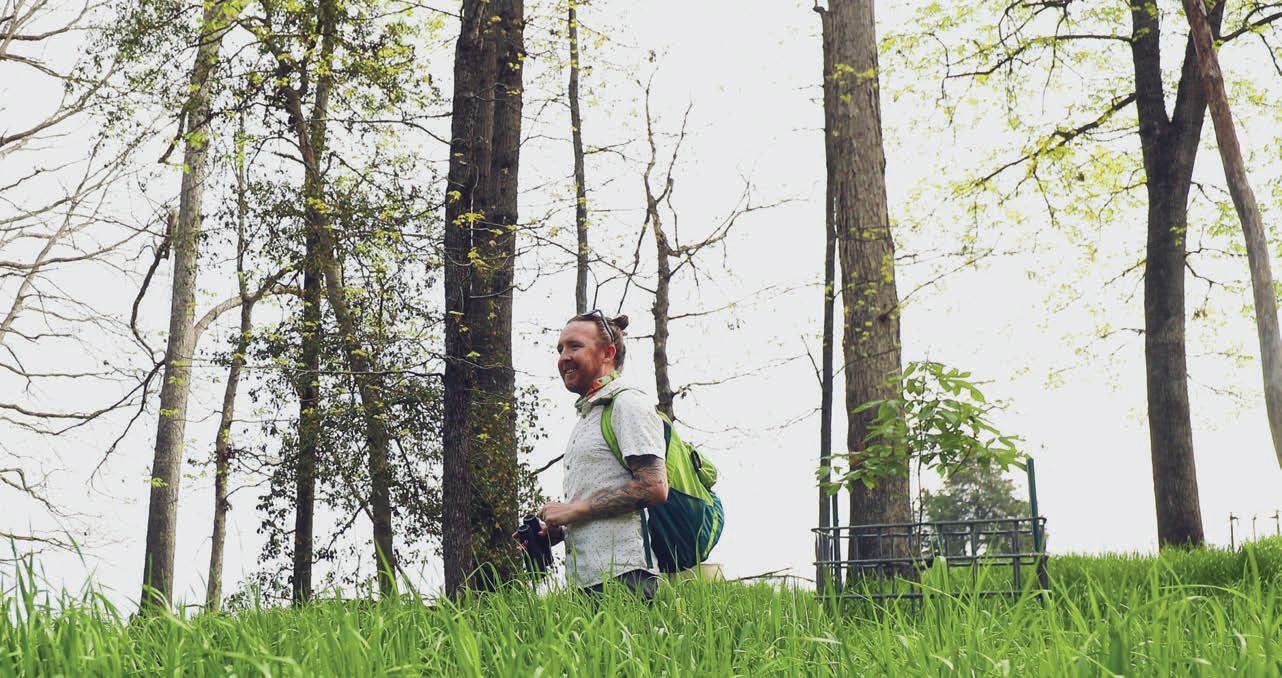
John Quinn, associate professor of biology, visits Greenbrier Farms in Easley, South Carolina, as part of his research into agriculture and biodiversity evaluated through birdsong analysis. Quinn’s students have participated in the work and used the data they collected in his research methods class.
BEGIN WITH BELONGING 31
A LASTING WIN
A shared challenge radiates from the center of the team experience.
It calls us to shoulder the struggles that affect the group and the members, both. At Furman, our student-athletes drew strength from a distinct dynamic this past academic year –the belonging they experience as Furman students prepared them for the hardships and uncertainties of playing through a global pandemic.
Through it all, our student-athletes kept up their academic excellence: 86 Paladins were named to the Academic All-Southern Conference Team, while 234 made the 2020-21 Southern Conference Academic Honor Roll – a program record of 69% of all university student-athletes across 18 sports.
We had more reasons to celebrate, including record-breaking fundraising success: The new indoor golf training space, the Davis and Faxon Training Facility, drew close to completion. The facility is intended to help recruit the best student-athletes, and it reminds us that the alumni who helped make the facility a reality are committed to positioning current and future Paladin golfers for victory.
Competing and succeeding
•
4 NCAA Team Tournament Qualifiers
• 7 Southern Conference Player of the Year awards
• 7 Southern Conference Championships
• 4 Southern Conference Coach of the Year awards:
- Robert Gary, Men’s Cross-Country
- Robert Gary, Women’s Cross-Country
- Doug Allison, Men’s Soccer
- Rachel Whitten, Women’s Lacrosse
• Women’s soccer player Jasmine Greene ’23 scored the game-winning goal with 17 seconds remaining to beat host Samford, 2-1, and give Furman the SoCon Tournament Championship.
• Women’s tennis recorded wins over Alabama, Wake Forest, South Carolina and Clemson en
route to earning the highest ranking (No. 23) in program history. Katarina Kozarov ’20 was ranked as high as 7th nationally, tying the best ranking in program history. She was named SoCon Player of the Year for the third straight year and went undefeated for her career versus SoCon opponents. Kozarov and Julia Adams ’22 achieved the highest doubles ranking (16th) in program history.
All-Americans
• Cameron Ponder ’22, Indoor Track & Field
• Aaron Wier ’21, Indoor Track & Field
• Ryan Miller ’22, Football
• Katarina Kozarov ’20, Tennis
• Gabbi Jennings ’20, Outdoor Track & Field
Exceptional achievements
• Commissioner’s Cup, Men’s Teams
• 2nd in Germann Cup, Women’s Teams
• 1st Place SoCon School in Learfield Standings
• Women’s golfer Sarah-Eve Rhéaume ’22 won SoCon Tournament individual medalist honors to qualify for NCAA Regional play.
• Men’s golfer Keller Harper ’20 became the second player in SoCon history to earn Player of the Year honors three times and was selected as an individual participant to the Tallahassee Regional, joining Brad Faxon ’83 as the only players in program history to compete as an individual at multiple NCAA Regionals. Harper finished in a tie for 14th place at the Tallahassee Regional.
• Men’s soccer was ranked as high as 23rd during the regular season.
• Gabbi Jennings ’20 was honored as the Southern Conference Female Athlete of the Year. She garnered a first-team All-America citation in the 3,000 meter steeplechase during the outdoor track season after finishing 7th at the NCAA Outdoor Championships, setting a program record of 9:38.24. She went on to place 22nd in the Olympic trials.
32 BEGIN WITH BELONGING
18 DIVISION I TEAMS

350
7 SOCON FEMALE ATHLETE OF THE YEAR 1 STUDENTATHLETES
SOCON CHAMPIONSHIPS
“Despite the challenges that COVID-19 presented, our studentathletes, coaches and staff consistently rose to the occasion to demonstrate their excellence in the classroom and in competition.”
FURMAN ATHLETICS DIRECTOR JASON DONNELLY
The Furman men’s cross-country team competes in the Southern Conference Championships in 2020.
 Barrett Taylor ’21 and Olivia McGuirt ’21 pose in front of Furman’s Bell Tower during Commencement 2021.
Barrett Taylor ’21 and Olivia McGuirt ’21 pose in front of Furman’s Bell Tower during Commencement 2021.
“We make it so easy and inclusive. Just walk in, no need to fill out an application. Just find a cool project and start.”
BARRETT TAYLOR ’21, Heller Service Corps volunteer
BEGIN WITH BELONGING 35
PARTNERS IN PROGRESS
When our neighbors thrive, our communities flourish
When we combine social justice with environmental stewardship, we map a sustainable, inclusive future. And when our ideas are nourished, whether for new startup ventures or public policy studies, we grow closer to realizing our potential as a society with room and belonging for all.
For nearly 200 years, the Furman community has been enmeshed in the challenges, solutions and shared fortunes of South Carolina and beyond. It is a privilege that we honor. And it’s a trust that we earn anew with each community partnership – whether with Prisma Health, the Upcountry History Museum, the Greenville Drive or more than 70 nonprofits that serve South Carolina’s Upstate region.
Among the organizations and programs that make a measurable difference in the region and beyond are the Shucker Leadership Institute, the Furman Humanities Center, the Heller Service Corps and our four outward-facing institutes: The Hill Institute for Innovation and Entrepreneurship, The Institute for the Advancement of Community Health, The Riley Institute and The Shi Institute for Sustainable Communities.
At Furman, our students can take on health disparities in our neighborhoods, apply design-thinking to nonprofit work, help create a city’s sustainability plan, or represent the United States at the AsiaPacific Economic Cooperation. All of these
experiences – and so many others – are possible because of these institutes and the interdisciplinary philosophy that animates them. Together our institutes form a collective of expertise, extending a rich spectrum of immersive learning experiences and purpose-defining opportunities to students. The diversity of thought and specialization within this portfolio intersects with the liberal arts and sciences mission, allowing us to make progress on the world’s most stubborn challenges.
The Shi Institute for Sustainable Communities
The Shi Institute is a regionally centered, community-focused hub that promotes sustainable human flourishing and recognizes the interdependence between social and equity challenges and environmental issues. Furman again ranked among the top 10 baccalaureate universities for sustainability, according to the Association for the Advancement of Sustainability in Higher Education.
Launched in 2020 after building on its national renown as the David E. Shi Center for Sustainability, The Shi Institute connects campus and community to the work of developing sustainable communities. The institute’s three centers focus on education, applied research and leadership through a variety of programs.
Student Fellows, in which students take a lead role in addressing campus or community sustainability issues, hosted its 350th fellow. The Community Conservation Corps weatherized its 160th home and was one of three U.S. institutions recognized in the
36 BEGIN WITH BELONGING
International Green Gown Awards in the “Benefitting Society” category. The research team supported and informed critical community initiatives, including maps and analyses of local food insecurity, affordable housing, evictions, and access to health and social services. The institute launched a sustainability leadership program in partnership with Sustain SC and will help the city of Greenville facilitate and write its first sustainability plan.
Bridges to a Brighter Future, a college access and success program serving high school students through yearround programming, welcomes its 25th class this fall, supporting 25 high school graduates and more than 100 students in colleges across the country. The College Advising Corps’ eight college advisors assisted more than 1,100 South Carolina high school students this year.
The Riley Institute
The Riley Institute at Furman broadens student and community perspective about issues critical to South Carolina’s progress, builds and engages present and future leaders, and creates and shares data-supported information about the state’s core challenges.
In September, just before the presidential election, The Riley Institute and Furman’s Osher Lifelong Learning Institute co-presented the 10th annual StraightTalk series on voting rights. National experts, such as Robert Costa, moderator for PBS’s “Washington Week,” engaged in compelling discussions that drew hundreds of Furman students and viewers from across the state. After the U.S. Capitol insurrection in January, the institute hosted Derek Black, former white nationalist leader turned anti-racism advocate, to share his perspective on forces that motivated the mob.
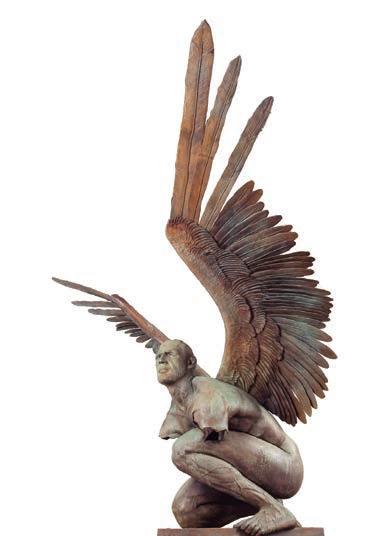
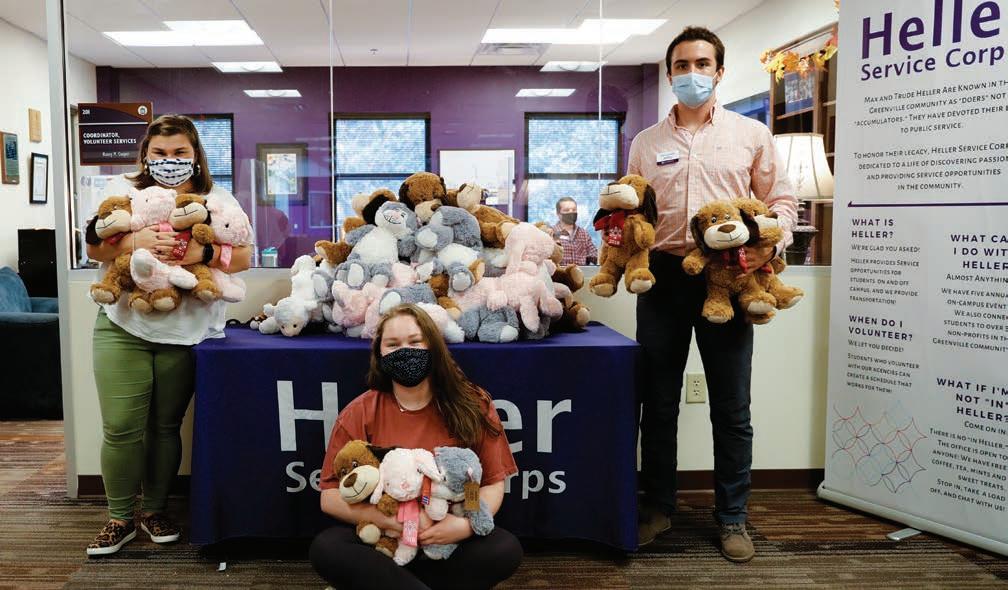
BEGIN WITH BELONGING 37
“El Tiempo,” sponsored by the Furman Humanities Center, is one of nine sculptures that make up the “Wings of the City” exhibit installed in downtown Greenville, South Carolina.
Students volunteering with the Heller Service Corps gather stuffed bears to bring to pediatric hospital patients in October 2020. From left: Barrett Taylor ’21, Kristen Janes ’21 and Andy Cockrell ’23.
In the fall of 2020, the choice to go virtual allowed the institute’s award-winning Diversity Leaders Initiative (DLI) to convene 46 participants in its first-ever statewide class, further growing the now 2,400-member cross-sector network of leaders equipped to leverage diversity to help drive solutions to long-term divisions and inequities that were exacerbated by the pandemic. The institute also launched a successful DLI graduate education program that helped 80 Riley Fellows navigate community and organizational expectations born from the current racial justice movement.
Institute staff also began work on an oral history book project about the South Carolina Education Improvement Act of 1984, which passed under the leadership of former Gov. Dick Riley ’54; completed a five-year evaluation of OnTrack Greenville, a United Way of Greenville County initiative that helps students at high-poverty middle schools stay on track to graduate; and saw the White-RileyPeterson Afterschool Policy Fellowship secure $310,000 through a continuation grant from the C.S. Mott Foundation.
The Hill Institute for Innovation and Entrepreneurship
The Hill Institute helps students launch social and entrepreneurial ventures. Now in its fourth year, the institute develops innovative and entrepreneurially minded leaders, grows an entrepreneurial community at Furman and contributes to the local and regional entrepreneurial environment.
Through pitch competitions, mentoring, internships, speakers, co-working spaces, boot camps and workshops, the institute – supported in part by its 45 Leadership Council members and 10 associate members – gives students from any discipline and major a platform to conceptualize, test and launch their social and entrepreneurial ventures. This mission’s key drivers include community partnerships with the S.C. Department of Commerce, the city of Greenville, Village Launch, NEXT and angel investor group VentureSouth. The institute’s third annual Summer Business and Innovation Boot Camp has now enrolled more than 83 students, including 25 in the past year, representing 13 universities.

Incoming first-year students who are recipients of select scholarships participate in the four-day Advantage Scholars Summer Program through The Riley Institute in June 2021.
Meanwhile, at the second annual Paladin Pitch Competition, more than 300 virtual attendees watched five competitors vie for more than $20,000 in grant awards. In October 2020, the Global Consortium of Entrepreneurship Centers recognized The Hill Institute as an Outstanding Emerging Entrepreneurship Center.
Expanding Furman’s presence in the community, the institute located offices in downtown Greenville with NEXT, serving as the lead convener of entrepreneurship support organizations alongside the city. This year, the institute also launched a design-thinking partnership with Prisma Health, in which clinicians at Prisma Health, Furman students and Greenville County School District administrators used design thinking methodology to address their organizations’ problems.
The Institute for the Advancement of Community Health
IACH facilitates high-impact student experiences and community engaged research, focusing on building partnerships in education and research, and championing key community programs with a commitment to health equity, justice and diversity.
The Institute for the Advancement of Community Health launched its inaugural leadership council in the Spring of 2021. The council champions, informs and advises the work of the institute, and serves as mentors to students and liaisons to the local, regional and national community health network.
In alignment with our commitment to health equity, justice and diversity, IACH hosted Finding Our Way Forward, a virtual session focused on identity-based inequities, their effects, and ways to combat oppression and injustice. The session was facilitated by President & CEO of CommonHealth ACTION Natalie Burke, and drew more than 150 community members and health care professionals, as well as Furman faculty, administration, staff and students.
IACH expanded its partnership with the Magdalene Clinic to Oconee County, South Carolina, building on the initial success of the Greenville clinic. To date, the Greenville clinic has provided care for more than 325 women and hopes to see 30 women a year in the Oconee clinic. IACH continues to provide coordination and evaluation for this project.
The Master of Science in Community Engaged Medicine program welcomed its fourth, and largest cohort, 22 students, in June 2021, after receiving the highest volume and most competitive round of applications to date.
This year, the Medical Legal Partnership received its 1,000th referral. Since its start in 2016, the Medical Legal Partnership has connected Furman University, Prisma Health and South Carolina Legal Services in work to improve the health of people throughout the Upstate, especially those living in poverty.
THE FOUR INSTITUTES FORM A COLLECTIVE OF EXPERTISE AND PROVIDE STUDENTS WITH ENGAGED LEARNING OPPORTUNITIES AND PURPOSE-DEFINING EXPERIENCES.
BEGIN WITH BELONGING 39
 Harmonie Burney, graduate student in chemistry, conducts research on mushrooms in August 2020 in Furman’s Townes Science Center.
Harmonie Burney, graduate student in chemistry, conducts research on mushrooms in August 2020 in Furman’s Townes Science Center.
Prepared to compete
The Malone Center for Career Engagement conducted 19 virtual career panels during the 2020-21 academic year, engaging 369 students with 62 alumni. The center also hosted its first-ever virtual career fair, Furman Career Connections, in February. The event provided more than 100 Furman students with the opportunity to connect with 40 top employers, including BMW, the U.S. State Department, Mather Economics, Nike, Hachette Book Group and ESRI.
The Malone Center also launched a senior outreach campaign in the fall of 2020. All seniors were paired with a dedicated career advisor to support them with their post-graduation plans throughout the year. Career advisors made 538 phone calls to seniors to offer support with their postgraduation plans and conducted 476 career advising appointments with seniors during the 2020-21 academic year.
Graduate studies at Furman Furman’s four master’s programs offer students challenging coursework, field experiences and internships, to build the skills, creativity and knowledge to advance their careers.
MASTER OF SCIENCE IN CHEMISTRY
• The Master of Science curriculum is part of a five-year program in which students typically earn their Bachelor of Science after four years.
MASTER OF SCIENCE IN COMMUNITY ENGAGED MEDICINE
• This one-year master’s program provides an advanced understanding of science and population health related to the disparities between a population’s medical needs and resources.
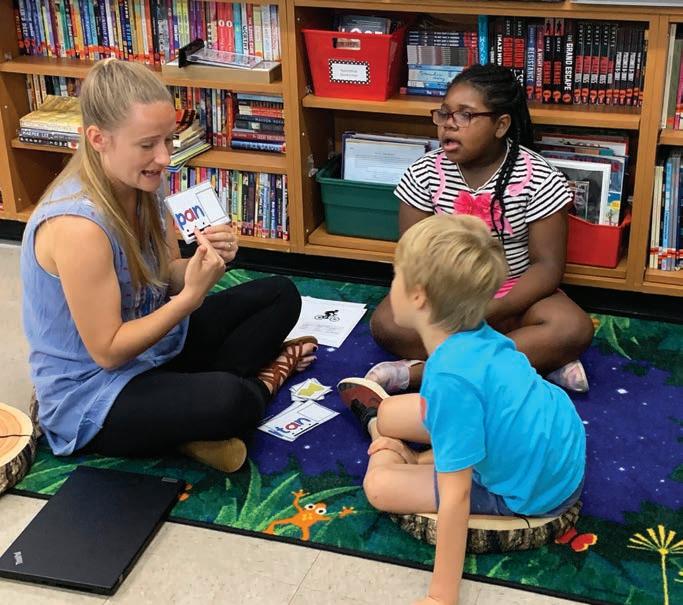
GRADUATE PROGRAMS IN EDUCATION
• Master of Arts degrees are offered in teaching and in education, while the Education Specialist degree is a postmaster’s degree for experienced scholars and leaders in education.
MASTER OF STRATEGIC DESIGN
• The Master of Arts in Strategic Design provides an advanced understanding of art and communication theory through a portfolio school model.
BEGIN WITH BELONGING 41
Sarah Bradley, a Furman graduate student in education, teaches elementary school students in July during the university’s Summer Learning Place program, part of a graduate-level internship course leading to certification in special education.
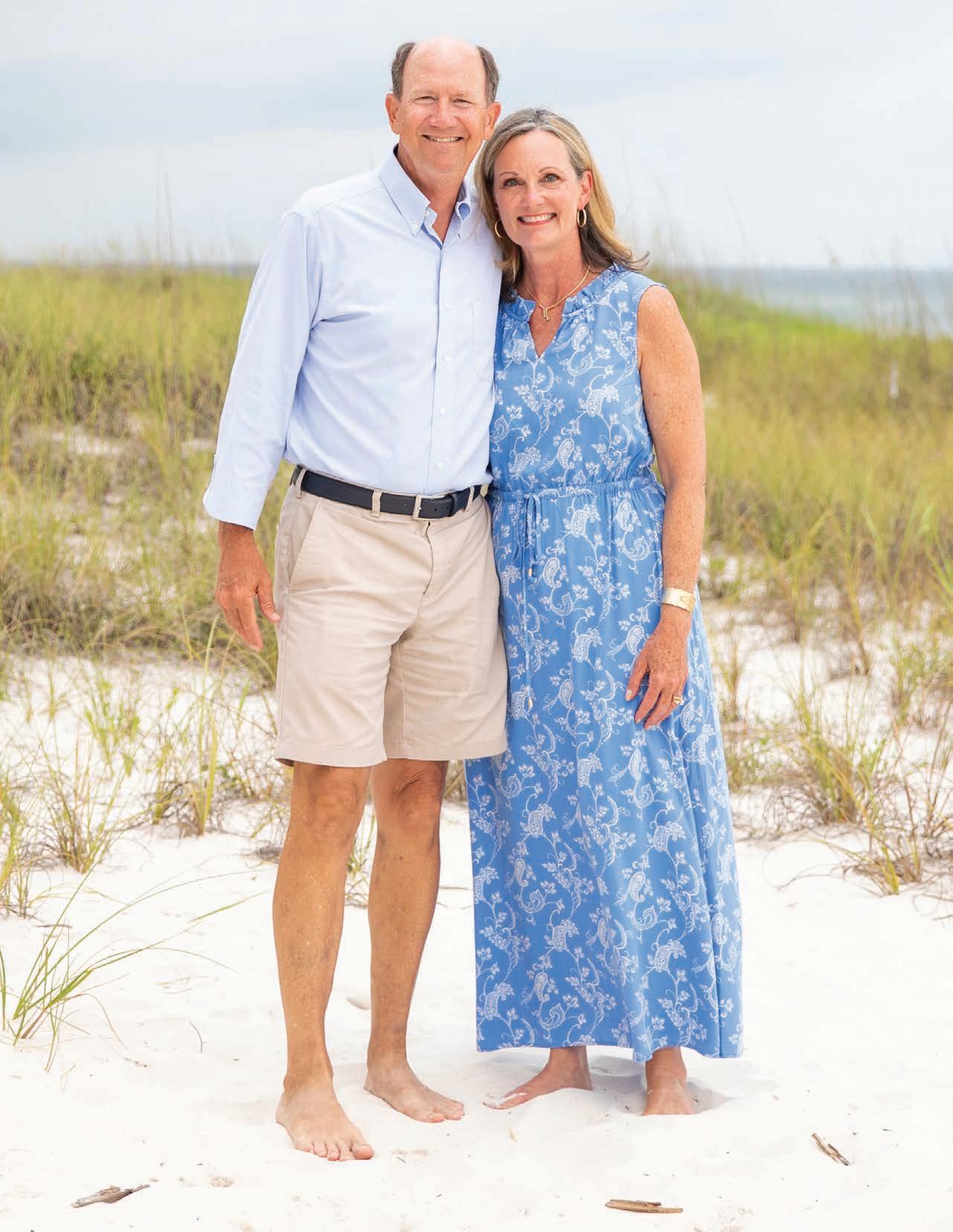 James A. Lanier Jr. ’79 and Mary Anne Anderson Lanier ’79
James A. Lanier Jr. ’79 and Mary Anne Anderson Lanier ’79
“For us, sustainability is very much a part of our DNA now. In the 40 years since we’ve graduated, it’s remarkable how much smaller the world has become.”
MARY ANNE ANDERSON LANIER ’79
BEGIN WITH BELONGING 43
A HOPE THAT TRANSFORMS
Philanthropy inspires community.
At its basic definition, philanthropy is the desire to promote the welfare of others. Giving to Furman is an act of connection. Connection to what we value. Connection to what has impacted our lives. Connection to the future. Most of all, giving is an act of connection to the people of the university and each other –students, faculty, staff, alumni. When we give to Furman and join so many others across the generations who have given, we belong to this community in deeper, more meaningful ways. After a year where our very understanding and experience of community was challenged and stressed, Furman’s shared core commitment to care for each other made this last surreal year successful, and even record-setting.
Collectively, 2020-21 marked one of the best years of philanthropy in Furman’s history with a total of $64 million in commitments from more than 7,000 donors, including a record of more than $10 million for athletics. Community and philanthropy were front and center for Dins Day in April
2021. Donors from all parts of the university community came together to support those aspects of Furman that they care most about, the parts of Furman that belong to them and make them feel as though they belong to Furman. That day, over 3,100 gifts from alumni, parents and others –meaningful gifts of every size – made a powerful statement to our students that, as a community, we are invested in them and their success.
James A. Lanier Jr. ’79 and Mary Anne Anderson Lanier ’79 previously committed $1.05 million to invest in Furman University’s Shi Institute for Sustainable Communities and added to it in March with a $1 million planned giving commitment to Furman, bringing their total commitment to more than $2.2 million.
Scholarship gifts through the Partners Program and other endowments help free students from financial worry, enabling them to immerse themselves in their Furman experience and The Furman Advantage. This year the senior class made their gift of over $30,000 from more than 52% of the class to the Joseph Vaughn ’68
ENDOWMENT POOL AND TOTAL ENDOWMENT
As of June 30, 2021, Furman’s total endowment was valued at an estimated $839 million, of which $642 million was invested in the endowment pool (the portion under the decision-making authority of the university). The remainder of the endowment is separately invested or managed by other entities.
44 BEGIN WITH BELONGING $200M $400M $600M $800M $300M $500M $700M $900M FY12FY13FY14FY15FY16FY17FY18FY19FY20FY21
TOTAL ENDOWMENT ENDOWMENT POOL
Scholarship. With their gift, the Class of 2021 made a commitment to their alma mater that Furman belongs to them, and that they will care for and lead her in the future. Other donors joined them as over $67,000 in total was raised for the Vaughn Scholarship to support a more diverse and inclusive student body.
The Furman University Investment Office collaborates with the Furman Board of Trustees’ Investment Committee, senior financial staff and external consultants to preserve and enhance the purchasing power of the endowment and support the current and future operations of Furman.
The university has adopted an investment strategy that emphasizes the prudent management of risk, while working to generate long-term total return. Investments are diversified across a broad variety of asset classes – a strategy that, historically, has been shown to mitigate risk while enhancing portfolio performance.
During the 2020-21 fiscal year, approximately $31.7 million was distributed from the total endowment, in accordance with the boardapproved spending policy. These assets contributed approximately 21.4% to the university’s annual budget.
2020-21 MARKED ONE OF THE BEST YEARS OF PHILANTHROPY IN FURMAN’S HISTORY.
BEGIN WITH BELONGING 45
ASSET ALLOCATION Hedged strategies 17.6% Private equity/ Venture 22.3% Real assets/ Natural resources 8.8% International equities 23.2% Fixed income 7.5% U.S. equities 17.6% Cash 3.0% ENDOWMENT DISTRIBUTION Departmental, library, programs, other 21% Scholarships 47% Professorships 9.0% Facilities, operation, maintenance, improvement 12% Unrestricted budget support 11%
OF STUDENTS RECEIVED SOME FORM OF FINANCIAL AID

$43,146
AVERAGE FINANCIAL AID PACKAGE
90.5% $69,427,567
TOTAL FINANCIAL ASSISTANCE FURMAN AWARDED TO STUDENTS
$1.9 M
SUMMER RESEARCH AND INTERNSHIP FELLOWSHIP PROGRAM (multiple sources, including external grants and endowed funds)
Gifts to the university make an impact far beyond the Furman community. Gifts to Furman positively impact the economy through a new small business developed by an alumna. They enhance our community schools through the volunteer efforts of an alumnus. Gifts to study away experiences empower our students to belong to a larger, more diverse world. Athletics gifts inspire our student-athletes to connect to each other and work together for a common goal.

Gifts to student research experiences help inspire the next great medical discovery. And, gifts to a Furman institute help to solve a societal challenge through a partnership with the community.
Philanthropy inspires the work of Furman faculty, students and staff and helps all of our students, and indeed all of us, to feel more deeply connected to our mission, to each other, and to our commitment to changing the world in positive ways.
furman.edu
© 2021 Furman University. Furman University does not unlawfully discriminate on the basis of race, color, national origin, sex, sexual orientation, gender identity, disability, age, religion, veteran status or any other characteristic or status protected by applicable local, state or federal law in admission, treatment, or access to or employment in, its programs and activities.

 Students gather during Fall Orientation in 2020.
Students gather during Fall Orientation in 2020.



 President Elizabeth Davis
President Elizabeth Davis


 Ariel Crank ’22
Ariel Crank ’22
 Adi Dubash, the Henry Keith and Ellen Hard Townes Assistant Professor of Biology, discusses research with Madison Thomas ’21.
Adi Dubash, the Henry Keith and Ellen Hard Townes Assistant Professor of Biology, discusses research with Madison Thomas ’21.




 Qwameek Bethea ’21 speaks in April 2021 during the Joseph Vaughn ’68 statue unveiling.
Qwameek Bethea ’21 speaks in April 2021 during the Joseph Vaughn ’68 statue unveiling.





 Ingrid Ramos Rivera ’21
Ingrid Ramos Rivera ’21

 Erik Ching, the Walter Kenneth Mattison Professor of History and director of undergraduate research
Erik Ching, the Walter Kenneth Mattison Professor of History and director of undergraduate research






 Barrett Taylor ’21 and Olivia McGuirt ’21 pose in front of Furman’s Bell Tower during Commencement 2021.
Barrett Taylor ’21 and Olivia McGuirt ’21 pose in front of Furman’s Bell Tower during Commencement 2021.



 Harmonie Burney, graduate student in chemistry, conducts research on mushrooms in August 2020 in Furman’s Townes Science Center.
Harmonie Burney, graduate student in chemistry, conducts research on mushrooms in August 2020 in Furman’s Townes Science Center.

 James A. Lanier Jr. ’79 and Mary Anne Anderson Lanier ’79
James A. Lanier Jr. ’79 and Mary Anne Anderson Lanier ’79

